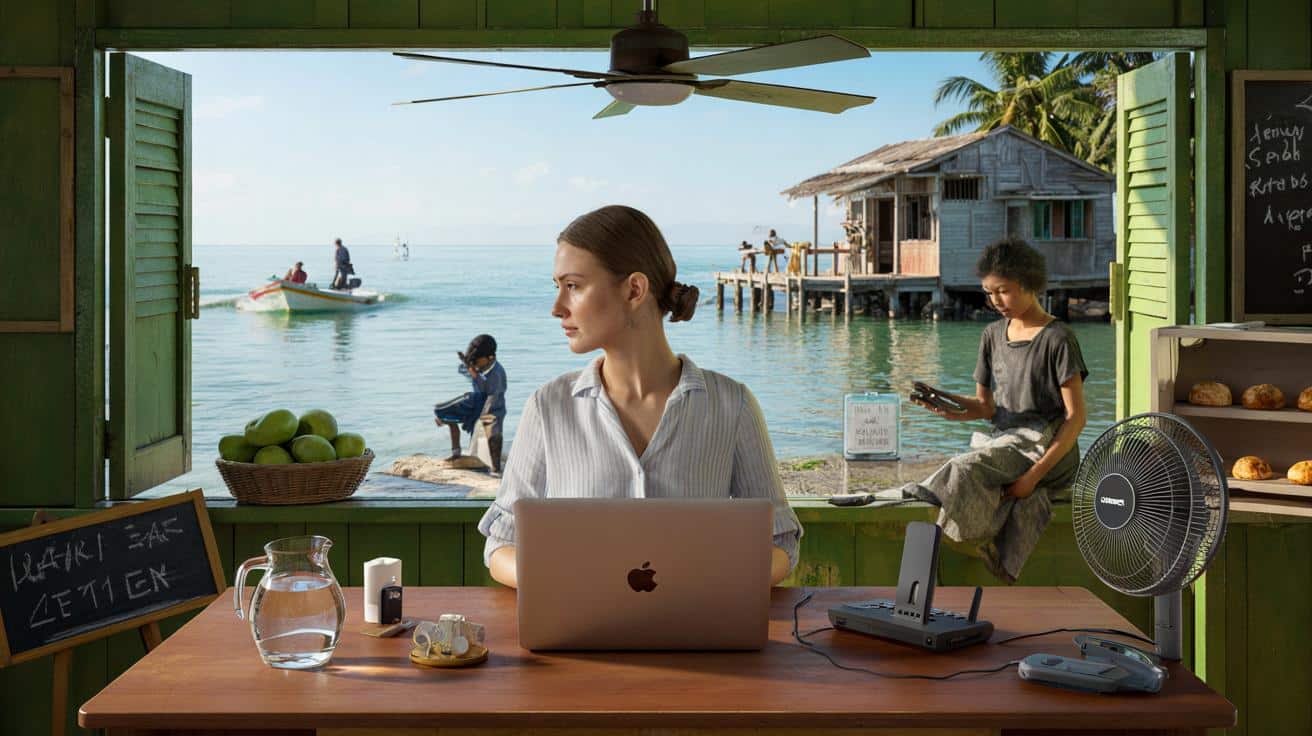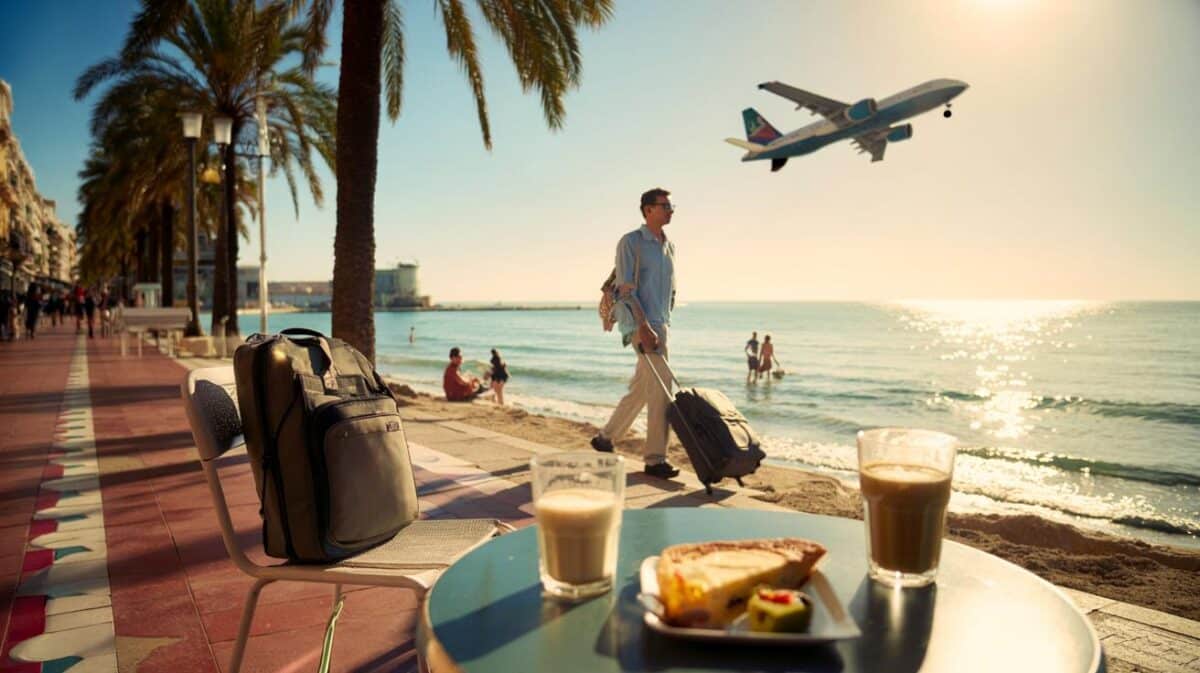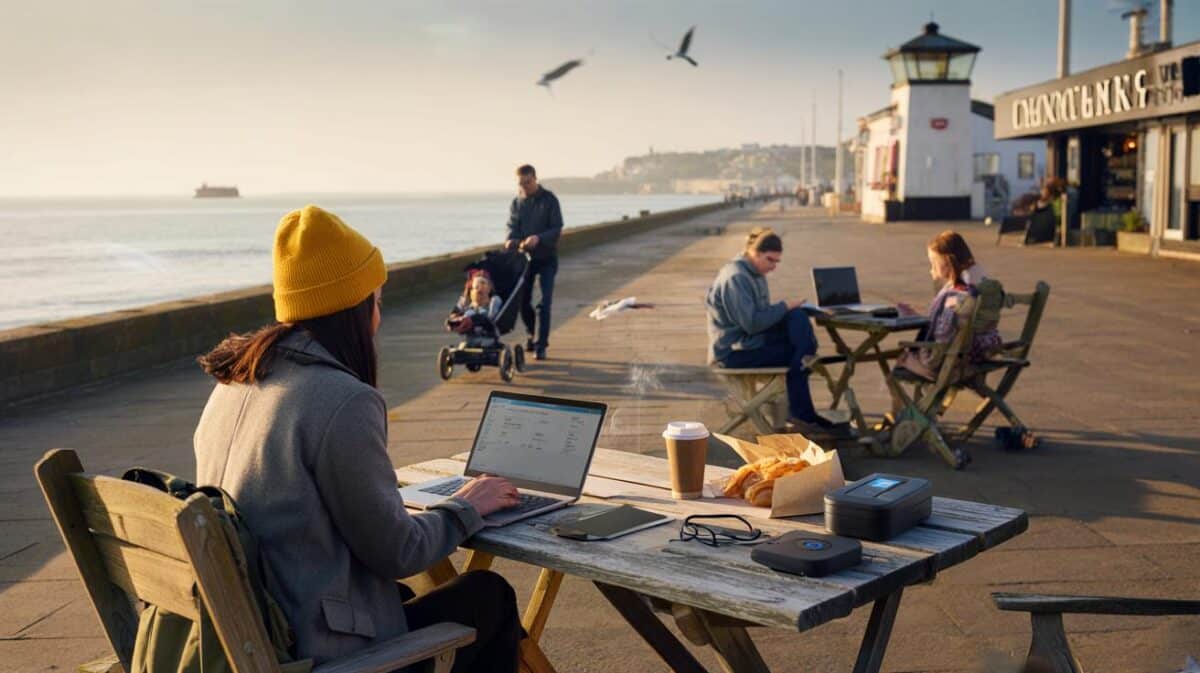The pull isn’t wild parties or flashy villas. It’s hush. Tide. Air you can hear. And a bill so small it makes your calendar feel lighter.
I arrived on the afternoon boat with salt on my sunglasses and a laptop in my rucksack. Someone had chalked “ROOMS FROM 150” on a sun-bleached board by the pier, next to a basket of green mangoes. A ferryman shrugged and said, “Long stay? Less.” No sales pitch, just the rhythm of a place that doesn’t chase you. In the café, a teenager tethered a phone to a router and aced a maths quiz while a baker slid coconut buns from a rusted oven. The loudest sound at noon was a gecko clicking at the ceiling fan. A woman from Leeds, bare feet and a neat bun, laughed into her headset: “Yes, I can do Thursday.” Here, rent really does cost less than a takeaway. Which changes everything.
Why a whisper-quiet island is prising people from their desks
The lure starts small: the first morning you wake to water lapping instead of a Slack ping. Then it creeps. You notice you’re measuring your day by the tide chart, not the meeting matrix. Strangers nod hello, then leave you alone. You write a paragraph you’ve been dodging for months and it doesn’t feel like a fight. **Rent that costs less than a takeaway isn’t clickbait; it’s Tuesday on the noticeboard by the pier.** Two digits for a clean room, a fan, a desk, and a jug of drinking water. It’s humble. It’s enough. And enough is a revolution.
Maya, 31, from Salford, arrived for a week and stayed for a quarter. She does product support for a fintech in Shoreditch, four hours a day on a UK contract. On day three she found a room above a grocery shack, a moss-green balcony with a sea peek. She pays the rough equivalent of one Deliveroo per day, less on a month-to-month handshake. “I keep London hours and swim at lunch,” she told me, pointing at her kettle and a line of teabags like medals. On Sundays she joins a market WhatsApp to buy aubergines and limes. The landlord’s wife slips her mangoes when the trees are heavy.
Strip away the romance and the maths is simple. When living costs shrink, risk tolerance grows. Quitting a rigid 9-to-5 becomes a sabbatical, not a cliff edge. You don’t need a runaway app or swollen savings to try a new rhythm. You need Wi‑Fi that holds through a Zoom and a room that doesn’t eat your paycheque. Low rent is a lever that moves the rest: you can downshift, freelance, retrain, or restart. It’s not escapism; it’s a budget line that buys time, which buys attention, which makes work feel less like a cage and more like a craft.
How people actually make it work (without turning it into a fantasy)
Think like a slow traveller, not a tourist. Book two nights, then walk. Talk to the shopkeeper who sells SIM cards, ask where teachers and nurses rent. Negotiate face to face, kindly. Pay in local currency and in full for the first week to build trust. Test the router at load time, not at 10am when the island’s asleep online. Buy a cheap UPS to avoid the odd brownout. Set your work blocks around the island’s rhythm: early mornings before the sun climbs, late afternoons when the breeze returns.
Pack the unglamorous things that buy peace: a long laptop cable, a clip-on fan, a dry bag, mosquito coils. Keep a second network option—a local SIM or pocket hotspot—so you’re not held hostage by its one sulking mast. We’ve all had that moment where a call drops right before your big line; breathe, message fast, rejoin. Ask neighbours how the island shifts in rainy season. Plan visa days like dentist appointments. Soyons honnêtes : personne ne fait vraiment ça tous les jours. You’ll work some weekends and take some Tuesdays off. That’s the point.
Locals will show you the playbook if you show up like a neighbour, not a pirate. *The loudest noise at noon is your own breathing.*
“Don’t try to change the island,” said Ben, a retired engineer who fixes boat engines for fun. “Let it change your schedule. You’ll get more done.”
- Learn two phrases by heart: hello and thank you. Doors open.
- Buy water in bulk and share the cost with your next-door room. Less plastic, less faff.
- Keep cash for rent day. ATMs hiccup after storms.
What this shift really says about work, money and the noise we tolerate
What’s startling isn’t that an island can be cheap. It’s that so many of us need to cross water to remember what work feels like when it isn’t frantic. You notice how much of a city salary is soundproofing against stress: takeaways because you’re wrecked, transport because the office is there, extras because you’re numb. On a quiet shore, the craving for “treats” shrinks. A mango becomes theatre. A swim at six feels like a raise. **The bargain isn’t just money — it’s time, space, and headroom.** It might not last forever, and that’s fine. Even a season can reset your expectations of what a reasonable day looks like. Ask anyone who came for a fortnight and left with a different calendar: once you’ve rented calm for less than a curry, the old noise is harder to buy.
| Point clé | Détail | Intérêt pour le lecteur |
|---|---|---|
| Find rent offline | Walk, ask shopkeepers, check noticeboards | Better prices and trusted landlords |
| Double up internet | Router + local SIM hotspot | Fewer dropped calls, steady workdays |
| Budget by rhythm | Work in cool hours, rest at noon | Higher focus, lower stress, real productivity |
FAQ :
- Where is this “quiet island” everyone’s whispering about?There isn’t just one. Southeast Asia and parts of Central America have small islands with modest long-stay rents. The story is a pattern, not a pin on a map.
- Is rent really cheaper than a takeaway?For basic rooms on long-stay deals, yes—especially when priced per day or in local-market terms. Think fan room, clean bathroom, not a boutique suite.
- Can I keep my UK job and work from there?Plenty do. Check your employer’s policies, time zones, and tax rules. Start with a trial month and show results.
- What about visas and healthcare?Read the current entry rules, buy travel medical cover, and know where the nearest clinic sits. Keep copies of documents on and offline.
- Will island life get boring?Only if you expect city buzz to follow you. People build routines around swims, books, calls with home, and small projects that breathe. The quiet is a feature, not a flaw.










Honestly this sounds like the reset I need. The detail about testing the router at peak load is gold, and the reminder to budget by the cool hours fits my brain better than back‑to‑back Zooms. If a clean fan room really is two digits a day, that’s the first time risk feels… affordbale. Any tips for finding month‑to‑month places without getting ghosted after the first week? New to negociating face‑to‑face.
I’m curious how this plays out for locals. When remote workers arrive, do rents creep up anyway? The piece says « don’t change the island, » but money changes things. Are there examples where long‑stay folks contributed (teaching, clean‑ups) rather than just extract? Also—gentrificaiton can happen in fan rooms too.